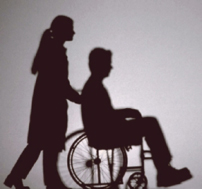Common Client Questions
 We understand the difficulty of your situation and want to help you find your way to a full solution. In order to better understand the process of securing your claim, we have prepared an extensive list of frequently asked questions or FAQ. Please look through these to find the answer to your concerns. If your answer is not here, we are ready to help you further either by phone or e-mail.
We understand the difficulty of your situation and want to help you find your way to a full solution. In order to better understand the process of securing your claim, we have prepared an extensive list of frequently asked questions or FAQ. Please look through these to find the answer to your concerns. If your answer is not here, we are ready to help you further either by phone or e-mail.
How does the Social Security Administration define “disability?”
Social Security defines disability as having an impairment or combination of impairments which are expected to keep you from performing any substantial gainful activity for 12 consecutive months, or which are expected to result in death. Keep in mind that SSA isn’t concerned whether you can go back to your old job or whether you can’t do a job which requires a lot of heavy lifting and labor; the question is whether you are able to perform any type of jobs which exist in significant numbers in the national economy.
Do I have to be disabled for a year before I apply?
No. The Social Security Administration allows you to apply well before you have been disabled for a year as long as the evidence shows that your condition is “expected” to keep you from working for 12 consecutive months. Many people wait more than a year before filing. You may actually be losing benefits by waiting to file because SSA will only pay retroactive benefits for the 12 month period prior to the month of filing.
How do I apply for benefits?
The Social Security office which will serve you depends on where you live. To find your office, you can go click here and type in your zip code. To apply for benefits, you will be required to provide some documentation and you will be asked questions about your past work, your conditions, your doctors, and why you feel you can no longer work. Although you can always contact SSA via your local office, to apply for benefits, SSA prefers that you do so online. You can start an application by clicking here.
I applied for Social Security disability or SSI yet I have been contacted by an agency from my state. I thought Social Security/SSI disability was a Federal program.
It is. However, once the local Social Security office has taken all of your application information, they send it to a state agency (usually called Disability Determination Section or DDS) to process it. Every state has a DDS, some states have several. The DDS is staffed by state employees as well as doctors and psychologists who all consult on your case. The DDS handles the first two levels of a claim— initial and reconsideration claims.
What should I do if I am denied?
 Statistically, the overwhelming majority of people who apply for Social Security or SSI disability will be denied at the initial and reconsideration levels. Persistence is the name of the game. If you believe that you are disabled, we encourage you to reject SSA’s denials and appeal their decision(s). Appealing a denial is easy— you just need to call or write your local office. However, there is always a time limit to appeal— usually 60 days from the date of your denial. As such, you need to make sure you appeal the decision in a timely manner or SSA can reject your appeal and make you start all over.
Statistically, the overwhelming majority of people who apply for Social Security or SSI disability will be denied at the initial and reconsideration levels. Persistence is the name of the game. If you believe that you are disabled, we encourage you to reject SSA’s denials and appeal their decision(s). Appealing a denial is easy— you just need to call or write your local office. However, there is always a time limit to appeal— usually 60 days from the date of your denial. As such, you need to make sure you appeal the decision in a timely manner or SSA can reject your appeal and make you start all over.
Do I need representation?
Whether or not you appoint a representative is entirely your decision. SSA does not require you to have a representative during any level of the process. However, statistically, your chances of being approved increase dramatically with representation. Also, qualified representatives are experienced with the disability process and can guide you through it. Representatives can also prepare and present your case before an Administrative Law Judge.
How much does it cost?
The Social Security Administration must approve all fees in disability cases. Disability Consulting charges no money up front and no money at all unless we are able to win your case. If we do win your case, like most representatives, our fee is the lesser of 25% of your past due benefits or a cap which SSA sets— currently $6,000. Disability Consulting is paid directly from your back benefits. Nothing is withheld from your regular monthly checks.
What is the difference between an attorney representative and a non-attorney representative?
To the Social Security Administration, the short answer is “none.” To represent an individual in a disability case, SSA only requires that they be “qualified.” There are some attorneys who specialize in Social Security disability. However, the vast majority do many different types of cases-worker’s compensation, divorce, bankruptcy, personal injury, etc. Disability Consulting only practices in Social Security disability.
What, exactly, do representatives do that I can’t do by myself?
 To name a few, a qualified representative will: Analyze your case using experience and expertise; contact your treating sources (doctors, therapists, etc) and obtain a report from them which will actually be of value per SSA regulations; contact SSA to make sure they have done their part of the process; prepare you for a hearing; present your hearing to the Administrative Law Judge; cross-examine witnesses at your hearing who have given testimony that is unfavorable to you; present written legal briefs in your case; identify the regulations that were violated, misapplied or ignored when presenting appeals; and make sure you get fairly treated throughout the process.
To name a few, a qualified representative will: Analyze your case using experience and expertise; contact your treating sources (doctors, therapists, etc) and obtain a report from them which will actually be of value per SSA regulations; contact SSA to make sure they have done their part of the process; prepare you for a hearing; present your hearing to the Administrative Law Judge; cross-examine witnesses at your hearing who have given testimony that is unfavorable to you; present written legal briefs in your case; identify the regulations that were violated, misapplied or ignored when presenting appeals; and make sure you get fairly treated throughout the process.
My case is at the hearings level. What can I expect at my hearing?
Social Security bills the hearing before an Administrative Law Judge (ALJ) as an “informal conference.” It is private. Rarely is there any friction between parties. However, you will be sworn in by the ALJ, you will be expected to testify by answering questions from both the judge and your representative, and the ALJ will base his or her decision on the medical evidence, your age, education and work history, and the testimony you present at the hearing.
What can I expect from the application/appeals process?
The SSA will send lots of forms. They will expect that everything they ask you to do will be done within the timeframe they give you to do it. They may ask you to go to one of their doctors and or psychologists to be examined. They may call you and ask you questions about your case. Keep in mind that with the current volume of work SSA has to do, you can expect things to take some time.
How long does the application/appeals process take?
Processing times are always in a state of flux due to SSA staffing and the number of filings. On average, for Disability Consulting’s clients from 2007 to present, it takes about 4 months to get a decision on an initial claim, another 3 to 4 months on a reconsideration claim, and about 16 to 22 months to get a hearing. There are exceptions to these averages, but generally, this is what we’ve found.
At what point should I contact a representative?
 Although every situation is different, most of our clients come to us after they’ve been denied. As a general rule, because the application and appeals process does have timeframes and deadlines, it is important to contact a representative as quickly as you can. This gives us time to review the case, decide on whether it is one we want to take, and then to file a timely appeal with the SSA.
Although every situation is different, most of our clients come to us after they’ve been denied. As a general rule, because the application and appeals process does have timeframes and deadlines, it is important to contact a representative as quickly as you can. This gives us time to review the case, decide on whether it is one we want to take, and then to file a timely appeal with the SSA.
What if a representative won’t take my case?
Each representative has certain “comfort points” which dictate whether they feel a case will be winnable. Just because one representative declines to take your case doesn’t mean a different representative will feel the same way.
I have a history of drug and/or alcohol abuse. Can I still win my case? Will a representative even bother taking it?
You can still win. SSA law states that if drug or alcohol use/abuse are material in your disability— that is, if you stopped using drugs or alcohol, your condition would be better— you can not be found disabled. However, if your drug or alcohol abuse is not material— that is, even if you stopped using you would still have the same problems with the same severity— you can be found disabled. As to whether or not a representative will take the case, the answer is maybe. If your substance abuse is in the remote past, most representatives won’t be bothered by it. If it is recent or ongoing, the representative will certainly need to determine whether he or she feels it is material to your disability.
What is the difference between Social Security disability and SSI?
Social Security disability is a program based on your earnings. You must have worked long enough and paid into the system to qualify. The amount of your monthly benefits will be determined by the amount of money you made. For example, if you worked at a job making a high wage, generally your monthly benefits would be high. If you worked at a job making a low wage, your monthly benefit amount would be low.
SSI (Supplemental Security Income) is a needs-based entitlement program. It has nothing to do with the amount of money you paid in while you were working. It is generally for younger individuals or individuals who did not work at all or did not work long enough to qualify for Social Security disability. As an entitlement program, there are limits on what your household income is and what amount of resources you have. If your household income is too high, or your resources are too high, regardless of your health, SSA will find you ineligible.
 Will I get medical coverage if I win my case?
Will I get medical coverage if I win my case?
Generally, yes. For Social Security disability cases, after you have been deemed disabled for 24 months, you are Medicare eligible. For SSI cases, once allowed you are generally eligible for Medicaid or your state’s equivalent.
Once I’ve been found disabled, will I continue to draw benefits indefinitely?
If you are older than 52 at the time of your approval, chances are that your case will not be reviewed. At retirement age, your benefits will simply convert. If you are younger than 52 at the time of your approval, chances are good that your case will be reviewed from time to time. If, during one of these reviews, SSA determines that your condition has improved to the point where you can work, they will begin the “cessation” process in which your benefits will end. Of course, you can appeal this decision. Normally, during the appeal of a cessation, you can still draw benefits.
I was denied by a judge at my hearing. Now what?
For whatever reason, many attorneys and some representatives will not pursue a claim after a disability hearing. Disability Consulting will. The next step after being denied at a hearing is filing an appeal (which is actually a request for review) with the Appeals Council. Filing an appeal to the Appeals Council must be done in writing and generally consists of citing why the judge was wrong in denying you. However, success at the Appeals Council depends on being able to specifically cite the regulations which were misapplied or ignored by the judge. If the Appeals Council agrees, they generally remand (send the case back) to the judge that denied you, instructing him or her to correct the mistakes they made. This doesn’t always result in an allowance. On rare occasions, the Appeals Council will reverse the judge’s decision and allow the case.
And if the Appeals Council denies, am I done?
No. If the Appeals Council denies, you may continue your claim by filing suit in District Court.
 Don’t you have to have a lawyer to file suit in Federal Court?
Don’t you have to have a lawyer to file suit in Federal Court?
Yes. And although Disability Consulting is a non-attorney firm, we partner with qualified attorneys who file cases in Federal District Court.
